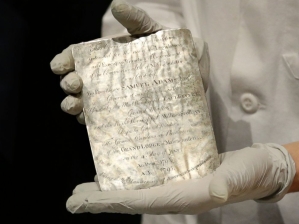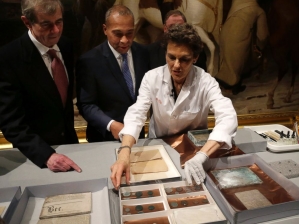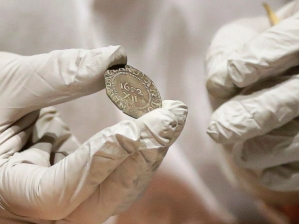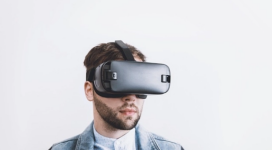
The oldest time capsule in the United States has been cracked open Tuesday in Boston, revealing relics saved by American founding fathers Samuel Adams and Paul Revere.
According to Catherine E. Shoichet of CNN, it took an hour to remove all the objects crammed into the capsule. It took a grand total of nearly four hours to loosen the screws of the box, which measured 5.5 by 7.5 by 1.5 inches.
"They said it was hermetically sealed, and I think they really meant it," Pam Hatchfield, the museum conservationist, said.
Hatchfield added that the paper pulled out of the capsule was "in amazingly good condition."
According to Michael Winter of USA Today, the capsule revealed a trove of coins, documents, newspapers and memorabilia dating from the American colonial era to the beginnings of the United States at a critical time in its history.
"The 10-pound, corroded copper box held two-dozen silver and copper coins from 1652 to 1855; a silver plaque engraved by Revere, who was a silversmith; a copper medal depicting George Washington; five newspapers; the seal of the Commonwealth of Massachusetts; 'calling' cards; and a title page from the Massachusetts Colony Records," Winter wrote.

Boston's Museum of Fine Arts oversaw the excavation process. The museum noted in its website that the capsule had been previously opened for documentation purposes.
"One of the oldest in the country, the time capsule was originally placed under the State House cornerstone in 1795 by Governor Samuel Adams, Paul Revere and William Scollay," the museum wrote. "It was previously unearthed in 1855, when the contents were documented and cleaned."
The museum added that new items were placed into the capsule after the original items were cleaned back in 1855. The capsule was then encased in a brass container, taken to the Massachusetts State House, and "plastered into the underside of a massive granite cornerstone."
The museum also shot X-rays into the capsule before opening it, confirming the 1855 description. Malcolm Rogers, director of Boston's Museum of Fine Arts, told CNN that knowing the contents of the box was nothing compared to seeing them in person.
"Though we knew a little bit about what was in the box, it was a moment of extraordinary excitement as this brass container just the size of a cigar box was slowly opened with surgical precision, and you suddenly found yourself in the presence of history," Rogers said.
The museum described how the capsule was stored.
"Located inside a carved depression within the stone, the time capsule was encased in plaster along with miscellaneous coins--a custom of the time that symbolized good luck," the museum wrote.

According to USA Today, the capsule was unearthed Dec. 11 in the cornerstone of the Massachusetts State House while workers tried to repair a water leak there.
CNN reported that the box-shaped capsule was placed in the State House cornerstone in 1795 by Revolutionary War hero, metalsmith and engraver Revere, brewer and Massachusetts governor Adams and local developer William Scollay. Revere was also responsible for lining the State House dome with copper.
The coins recovered from the capsule included half-cent, one-cent, half-dime, 10-cent and 25-cent coins according to CNN. Another set of coins had a copper medal showing George Washington and a pine tree shilling from 1652.
Hatchfield described how thrilling it was to excavate and open the time capsule.
"This is the most exciting project I've ever worked on," Hatchfield said to the crowd. "This is what we, as conservators, live for."
Secretary of Massachusetts Commonwealth William F. Galvin told CNN that after the objects go on display at the museum, it will be inserted again in the cornerstone of the State House. New objects from this era may be added to it as well.
"The governor has wisely suggested that we might," Galvin said, "so we'll think about it."







